翻译家庞德英文介绍
E.Pound翻译家 庞德及 翻译理论 简介

Ezra Pound
埃兹拉·庞德在英美现代诗坛和评坛上无可非 议是最有影响的人物,他对第一次世界大战后兴 起的现代文学运动的一代青年有着巨大的影响, 几乎是一位传奇式的人物。
庞德生于爱达荷洲,早年在宾夕法尼亚大学学 习.毕业时他不但精通英文文法和文学,而且掌握 了九种外语,22岁时在印第安纳的一所大学任教 授。由于他生活放荡,不久被解职,开始漂流他 乡。1908年来到伦敦并结识了著名爱尔兰诗人 W.B.叶芝。1912年他同几位青年诗人发起了意象 主义运动,成为英美新诗运动的积极倡导者。作 为一位诗人和诗歌理论家,他不但推动传播意象 技巧的新发明,而且还在探索盎格鲁-撒克逊,普 罗旺斯,汉语,日语及拉丁语诗歌并不断充实创 新,他的大多数杰作实际上是这些古老传统诗的 编译或再创作
Light rain is on the light dust. 渭城朝雨浥轻尘
庞德把握住了诗人诗歌语言中的图画性。 用“light”这个包含着清、轻、亮色含义的词
来点写出“雨”和“尘” 顿时就把原诗所要表达的语境刻画出来
“The willows of the inn-yard will be going greener and greener”
其中把“阳关”译成了“the gates of Go”
河西走廊尽头的阳关,和它北面的玉门关相对,从汉代以 来一直是内地通向西域的交通要塞,在盛唐人心中,从军或出 使阳关,是一种令人向往的壮举,“西出阳关”也因此而成为 中国文学一个常见文化意象,被人反复咏颂,具有了丰富的文 化意义。西出阳关在中国读者心中唤起的那种联想遥远、广裹、
二、 翻译是独立于原作的创作 对庞德来说,除了“阐释性翻译”外,还有“另一种翻
译”。“有时‘译者’显然是在创作新诗”,走出旧的逻辑, 回到当代,通过译语文化的主流诗学或译者的诗学进行调试。 这样,翻译就被视作改写,译作独立于原作,在译语文化中赋 予了新的意义。
Ezra-Pound-庞德

The
Seafarer《水手》 Translation from Old English. Cathay《华夏》(1915) Translation of ancient Chinese poetry. Hugh Selwyn Maubery《休· 赛尔温· 毛伯利》(1920) deplored the Western civilization in the Great War(WWI) and its afermath.
Cantos 诗章 (1915-1945) Pound`s major work. It is the inclusion of Chinese characters as well as quotations in European languages other than English. As in Pound's prose writing, the themes of economics, governance, and culture are integral不可缺少的 to its content.
In 1920, upest by WWI, Pound Moved to Paris. There he joined the group of the Lost Generation(“迷惘的一代”). In 1924, he chose to stay in Italy. When WWII broke out, Pound support the Mussolini government and against the American soldiers. In 1945, arrested by the U. S. and tried for treason, then sent to hospital after being declared insane. Secured by T. S. Eliot and Robert Frost and Hemingway, settled down in Italy for the rest of his life.
庞德译诗带给诗歌翻译的启示
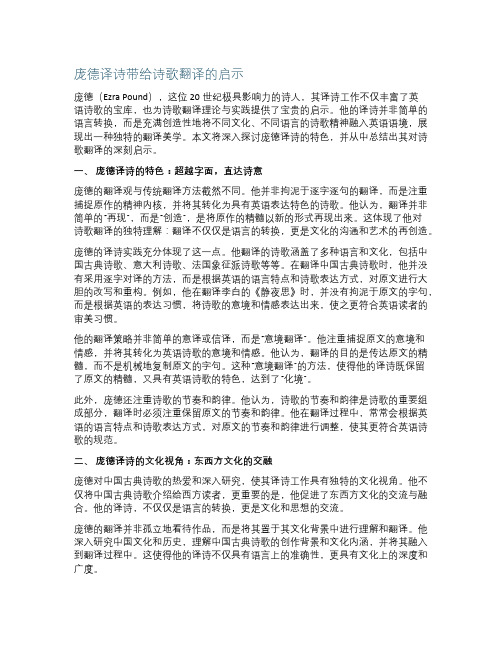
庞德译诗带给诗歌翻译的启示庞德(Ezra Pound),这位20世纪极具影响力的诗人,其译诗工作不仅丰富了英语诗歌的宝库,也为诗歌翻译理论与实践提供了宝贵的启示。
他的译诗并非简单的语言转换,而是充满创造性地将不同文化、不同语言的诗歌精神融入英语语境,展现出一种独特的翻译美学。
本文将深入探讨庞德译诗的特色,并从中总结出其对诗歌翻译的深刻启示。
一、庞德译诗的特色:超越字面,直达诗意庞德的翻译观与传统翻译方法截然不同。
他并非拘泥于逐字逐句的翻译,而是注重捕捉原作的精神内核,并将其转化为具有英语表达特色的诗歌。
他认为,翻译并非简单的“再现”,而是“创造”,是将原作的精髓以新的形式再现出来。
这体现了他对诗歌翻译的独特理解:翻译不仅仅是语言的转换,更是文化的沟通和艺术的再创造。
庞德的译诗实践充分体现了这一点。
他翻译的诗歌涵盖了多种语言和文化,包括中国古典诗歌、意大利诗歌、法国象征派诗歌等等。
在翻译中国古典诗歌时,他并没有采用逐字对译的方法,而是根据英语的语言特点和诗歌表达方式,对原文进行大胆的改写和重构。
例如,他在翻译李白的《静夜思》时,并没有拘泥于原文的字句,而是根据英语的表达习惯,将诗歌的意境和情感表达出来,使之更符合英语读者的审美习惯。
他的翻译策略并非简单的意译或信译,而是“意境翻译”。
他注重捕捉原文的意境和情感,并将其转化为英语诗歌的意境和情感。
他认为,翻译的目的是传达原文的精髓,而不是机械地复制原文的字句。
这种“意境翻译”的方法,使得他的译诗既保留了原文的精髓,又具有英语诗歌的特色,达到了“化境”。
此外,庞德还注重诗歌的节奏和韵律。
他认为,诗歌的节奏和韵律是诗歌的重要组成部分,翻译时必须注重保留原文的节奏和韵律。
他在翻译过程中,常常会根据英语的语言特点和诗歌表达方式,对原文的节奏和韵律进行调整,使其更符合英语诗歌的规范。
二、庞德译诗的文化视角:东西方文化的交融庞德对中国古典诗歌的热爱和深入研究,使其译诗工作具有独特的文化视角。
Ezra_Pound英文介绍

W. W. II, Italian government, radio broadcasts died in in 1972, in Italy
Pound’s
Ezra Weston Loomis Pound (October 30, 1885 – November 1, 1972) was an American expatriate poet, critic and intellectual who was a major figure of the Modernist movement in the first half of the 20th century. He is generally considered the poet most responsible for defining and promoting a modernist aesthetic in poetry.[1] The critic Hugh Kenner said of Pound upon meeting him: "I suddenly knew that I was in the presence of the center of modernism."[2] In the early teens of the twentieth century, he opened a fruitful exchange of work and ideas between British and American writers, and was famous for the generosity with which he advanced the work of such major contemporaries as Robert Frost, William Carlos Williams, Marianne Moore, H. D., Ernest Hemingway, Wyndham Lewis, and especially T. S. Eliot. Pound also had a profound influence on the Irish writers W. B. Yeats and James Joyce. His own significant contributions to poetry begin with his promotion of Imagism, a movement in poetry which derived its technique from classical Chinese and Japanese poetry—stressing clarity, precision, and economy of language, and forgoing traditional rhyme and meter in order to, in Pound's words, "compose in the sequence of the musical phrase, not in the sequence of the metronome."[3] His later work, spanning nearly fifty years, focused on his epic poem The Cantos.
约瑟夫·庞德(美国)人物简介

• 在英国和美国的报社担任过记者
• 在伦敦和纽约的学校担任过教师
⌛️
庞德在1914年移居美国
• 受到朋友的邀请,来到美国定居
• 在美国开始了他的文学生涯
02
约瑟夫·庞德的主要成就与贡献
约瑟夫·庞德在诗歌领域的成就
庞德被认为是20世纪最重要的诗人之一
• 他的诗歌作品具有很高的艺术价值
• 关注人类的命运和前途
• 反对战争和暴力
庞德的人文主义思想体现在他的诗歌作品中
• 对战争的反思
• 对人性的探讨
约瑟夫·庞德的现代主义倾向
庞德是现代主义诗歌的代表人物之一
• 强调诗歌的创新和实验
• 反对传统的诗歌形式和技巧
庞德的现代主义倾向体现在他的诗歌作品中
• 对传统的挑战
• 对个性的强调
⌛️
• 对后世诗人产生了深远的影响
庞德的诗歌作品具有独特的风格和特点
• 善于的诗歌作品涉及多种主题
• 对战争的反思
• 对人性的探讨
• 对文化的传承
⌛️
约瑟夫·庞德在翻译领域的贡献
庞德被认为是20世纪最重要的翻译家之一
• 他翻译了大量的古希腊、罗马和东方文学作品
• 为东西方文化的交流做出了巨大的贡献
庞德的翻译作品具有很高的艺术价值
• 他能够忠实地传达原著的精神
• 同时保持了自己独特的文学风格
庞德的翻译作品对后世翻译家产生了深远的影响
• 他的翻译方法和技巧被后人广泛借鉴
⌛️
约瑟夫·庞德在文学批评方面的观点
庞德对英国浪漫主义诗歌进行了深入的批判
• 认为浪漫主义诗歌过于主观和情感化
Ezra Pound庞德翻译理论与汉诗翻译完整版资料
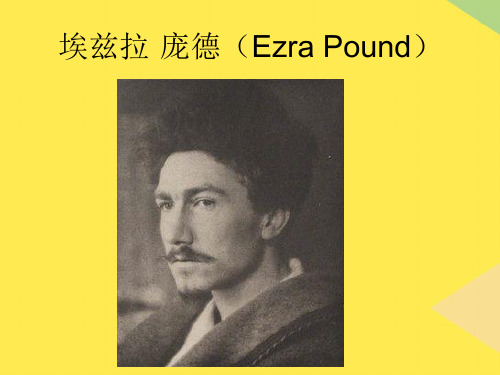
• 1930 A Draft of XXX Cantos, poems (New York)
• 1930 Imaginary Letters, essays
• 在诗歌理论上,庞德曾提出有关意象诗及“漩涡主 义”的观念,打破传统诗歌严密结构,促成英美现代诗歌 形式历史性的突破与发展,并且在开阔视野、搜胜猎奇、 吸收东方及古代文化方面有较大进步。庞德也是宣扬中国
文明、翻译介绍中国古诗的西方诗人之一。
庞德的翻译
庞德的第一个译本是翻译意大利13 世纪诗人卡瓦尔坎蒂(Guido
• 庞德从汉语文学的描写性特征中,看到了一种语言与意象的魔力,从 而产生对汉诗和汉字的魔力崇拜,长诗《诗章》中多处夹着汉字,以 示某种神秘意蕴,主张寻找出汉语中的意象,提出英文诗创作中也应 该力图将全诗浸润在意象之中。
贡献价值
• 1948年诺贝尔奖得主,大诗人T·S·艾略特的著名长诗《荒 原》的副题就是:“献给埃兹拉·庞德,最卓越的匠人”,该 诗曾得利于庞德的亲自修改。作为欧美现代主义文学公认 的鼻祖之一,庞德在艺术创作及批评理论方面都有较大影 响。
等。
Works
• 1908 A Lume Spento, poems (Venice) • 1908 A Quinzaine for This Yule, poems (London) • 1909 Personae, poems (London) • 1909 Exultations, poems (London • 1910 Provenca, poems (Boston) • 1910 The Spirit of Romance, essays (London) • 1911 Canzoni, poems (London) • 1912 Ripostes, poems (London) • 1912The Sonnets and ballate of Guido Cavalcanti, translations,
翻译家庞德英文介绍
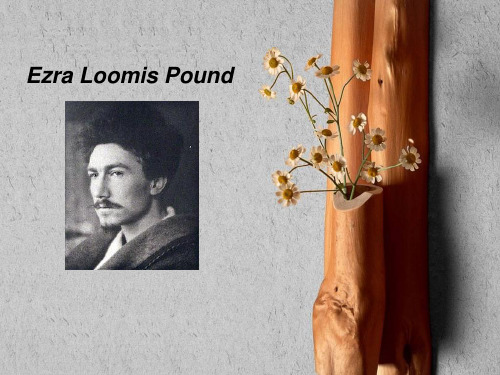
Ezra Pound with his mother in 1898, wearing his Cheltenham Military Academy Uniform.
Education
In 1892, he studied in Miss Elliott's school in Jenkintown.(珍金镇)
In 1893, he studied in the Heathcock family's Chelten Hills School in Wyncote. (温科特) In 1894, he attended to the Florence Ridpath school in Wyncote. After the academy he may have attended Cheltenham Township High School for one year, and in 1901, aged 15, he was admitted to the University of Pennsylvania's College of Liberal Arts. In 1903, he attended to Hamilton College in Clinton, New York.
While my hair was still cut straight across my forehead. I played about the front gate, pulling flowers. cut straight across my forehead与原文表示的刘海刚刚覆盖前
额有一定的差距。
不忠实。
同居长干里,两小无嫌猜。
And we went on living in the village of Chokan: Two small people without dislike or suspicion.
翻译名家介绍:EzraPound

艾兹拉。
庞德(Ezra Pound)
1885年出⽣于美国爱达荷州海莱市。
21岁时获宾⼣法尼亚⼤学⽂学硕⼠学位。
1909年前往伦敦,与当时在⽂坛上颇为活跃的休姆等⼈结识,庞德早期从事意象派的写作便是受这些⼈的影响。
1913年,弗。
福林特发表的意象派三点纲领,在两年后的《意象派诗选》的序⾔中,庞德⼜加了三条新原则:提倡⽤准确的⽇常语⾔,创造新的韵律以及⾃由选材。
这些主张对现代⾃由体诗的发展起了重⼤的作⽤,⽽也为庞德之后改写现代派诗作了准备。
1917年,庞德参与到温德汉。
路易斯创办的《风暴》杂志中,以表现⼒量为⽬的,宣扬应该改⾰意象派创作上的弊陋,要求那些善于写作平淡和伤感性诗歌的诗⼈⽤有⼒的、有运动感的意象和节奏来创作。
由于意见的相违,渐渐的庞德脱离出意象派。
1917年之后他开始了现代派的写作。
除此之外,庞德还是⼀个热衷于介绍中国古典诗歌和哲学的翻译家,经他改编并翻译了《神州⾏》、《诗经》等儒家经典。
代表作品:
《神州集》(1915年)
《休。
赛尔温。
莫伯利》(1920年)
《诗章》(1916-1968年)。
Ezra pound (1885-1972)

Ezra ቤተ መጻሕፍቲ ባይዱound(18851972) 艾兹拉· 庞德
By
GuanXiao
Ezra Pound was identified as the father of American poetry and the most influential leader of the Imagist Movement.
‘In a Station of the Metro ’
The apparition of these faces in the crowd; Petals on a wet, black bough.
1、在地铁车站 (辜正坤) 人丛中这些幽灵似的人脸, 潮湿的黑色树枝上的花瓣。
3、地铁站上 (余光中) 人群中,这些面孔的鬼影; 潮湿的黑树枝上的花瓣。
Cantos (1915)
● It contains 117 poems. ● It is about social history, cultures and languages. ● He imposes order and meaning upon a meaningless world. ● He sees Chinese history and Confucius孔子 counteract抵消 Western gloom and confusion. ● A chaotic inhuman and non-spiritual world needs saving.
庞德
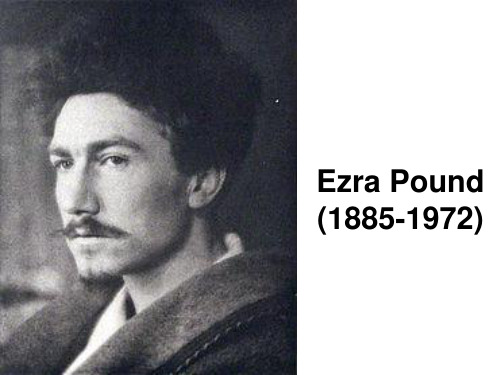
Education
Pound's early education took place in a series of so-called dame schools, From 1898 until 1900 he attended the Cheltenham Military Academy. Pound was clever, independentminded, conceited, and unpopular. Pound's first trip overseas came two years later when he was 13, a three-month tour of Europe with his mother and Aunt Frances, who took him to England, Belgium, Germany, Switzerland, and Italy. He was admitted to the University of Pennsylvania's College of Liberal Arts in 1901 at the age of 15.
Then he stay at psychiatric hospital in Washington, D.C., for over 12 years. In 1958, with the help of his friends that from the field of literature , he was release from the mental hospital . He return to Italy and died in Venice at the age of eightyseven.
庞德
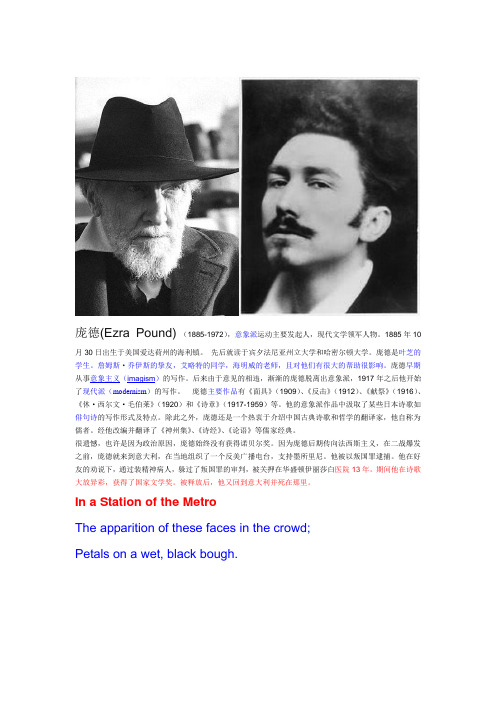
庞德(Ezra Pound) (1885-1972),意象派运动主要发起人,现代文学领军人物。
1885年10月30日出生于美国爱达荷州的海利镇。
先后就读于宾夕法尼亚州立大学和哈密尔顿大学。
庞德是叶芝的学生。
詹姆斯·乔伊斯的挚友,艾略特的同学,海明威的老师,且对他们有很大的帮助很影响。
庞德早期从事意象主义(imagism )的写作。
后来由于意见的相违,渐渐的庞德脱离出意象派,1917年之后他开始了现代派(modernism )的写作。
庞德主要作品有《面具》(1909)、《反击》(1912)、《献祭》(1916)、《休·西尔文·毛伯莱》(1920)和《诗章》(1917-1959)等。
他的意象派作品中汲取了某些日本诗歌如俳句诗的写作形式及特点。
除此之外,庞德还是一个热衷于介绍中国古典诗歌和哲学的翻译家,他自称为儒者。
经他改编并翻译了《神州集》、《诗经》、《论语》等儒家经典。
很遗憾,也许是因为政治原因,庞德始终没有获得诺贝尔奖。
因为庞德后期传向法西斯主义,在二战爆发之前,庞德就来到意大利,在当地组织了一个反美广播电台,支持墨所里尼。
他被以叛国罪逮捕。
他在好友的劝说下,通过装精神病人,躲过了叛国罪的审判,被关押在华盛顿伊丽莎白医院13年。
期间他在诗歌大放异彩,获得了国家文学奖。
被释放后,他又回到意大利并死在那里。
In a Station of the MetroThe apparition of these faces in the crowd;Petals on a wet, black bough.庞德《在地铁车站》的18种译文1.在地铁站人潮中这些面容的忽现;湿巴巴的黑树丫上的花瓣。
(罗池)2.地下车站人群中幻影般浮现的脸潮湿的,黑色树枝上的花瓣(钟鲲)3.地铁车站人群中这些脸庞的幻影;潮湿又黑的树枝上的花瓣.(成婴)4.在伦敦的地铁车站里这些脸的幻影在人群中,一条潮湿的、黑色枝干上的点点花瓣。
EzraPound庞德

精品资料
Imagism
• Imagism flourished from _19_0_9_t_o _1_91_7___and involved quite a number of _B_r_iti_sh__and _A_m_e_r_ic_a_n _writers and poets.
• The Imagist Movement advanced _m_o_d_e_rn_is_m__in __a_rt_s_and concentrated on reforming the __m_e_d_iu_m_of poetry as opposed to __R_o_m_an_t_ic_is_m_(. 浪漫主义(làngmàn zhǔ yì
庞德把意象称为一刹那间思想和感情的复合体用视觉意象引起联想表达一瞬间的直觉和思想
Ezra Pound (1885—1972)
The father of modern poetry
1
精品资料
Life Experience(18851972)
• Born in Hailey,Idoho in 1885.
④ He tries to render exactly his observation of human faces seen in an underground railway station. He sees the faces, turned variously toward light and darkness, like flower petals which are half absorbed by, half resisting, the wet, dark texture of a bough.
(装饰的,装饰性的 ) or superfluous(多余的; 不必要的;奢侈的 ) words, 3. and_r_h_y_t_h_m_ic_a_l_c_o_m_p_o_s_i_ti_o_n in the sequence of the musical phrase rather than in the sequence of a “___M__e_t_ro_n_o_m”.e(节奏器,拍子机 ) (直接表现(biǎoxiàn)主客观事物,删除一切无助于“表 现(biǎoxiàn)”的词语,以口语节奏代替传统格律。)
有关庞德

摘要:美国诗人庞德,意象派诗歌的代表人物,意象派运动主要发起人。
其《地铁站台》充分体现了意象派的创作原则,被看作意象派诗歌的典范。
本文通过对《地铁站台》的分析,着重讨论了中国古典诗歌对庞德的意象主义的影响。
关键词:意象主义;意象派诗歌;中国古典诗歌;庞德艾兹拉·庞德(Ezra Pound)(1885-1972),美国诗人,意象派诗歌的代表人物,意象派运动主要发起人。
庞德还是一个热衷于介绍中国古典诗歌和哲学的翻译家,经他改编并翻译了《神州集》、《诗经》等儒家经典,其误译常被作为翻译界研究的话题。
庞德终生不懈地推崇中国诗学,1915年,他曾在《诗刊》上撰文说,中国诗“是一个宝库,今后一个世纪将从中寻找推动力,正如文艺复兴从希腊人那里找推动力”。
无论是他用意象派风格翻译的李白的《长干行》(The River-Merchant…s Wife: A Letter),还是他本人的意象派诗歌作品都反映了中国古典诗歌对其意象主义的影响。
一、意象主义与意象派诗歌1908年前后,受法国象征主义诗歌影响,以庞德为首的西方诗人们,发起了一场旨在改变英国维多利亚王朝颓靡诗风的意象主义诗歌运动,推动了英美两国诗歌向现代诗的转变。
1908年,在英国伦敦,庞德与英国评论家托马斯·休姆(T.E.Hulme)一起创立了意象派诗歌,目的是使诗歌摆脱浪漫主义的伤感情调和无病呻吟,力求使诗具有艺术的凝练和客观性;文字要简洁,感情要含蓄,意象要鲜明具体;整个诗给人以雕塑感,线条明晰有力,坚实优美,同时又要兼有油画的浓郁色彩。
1912年,庞德与希尔顿·道利特尔和奥尔丁顿讨论了意象派诗歌的原则,并在1913年第6期的《诗刊》上发表了意象派的纲领,主要有三条:1.直接处理无论是主观的或客观的“事物”;2.决不使用任何对表达没有作用的字;3.在韵律方面,按照富有音乐性的词句的先后关联,而不是按照一架节拍器的节拍来写诗。
Ezra Pound
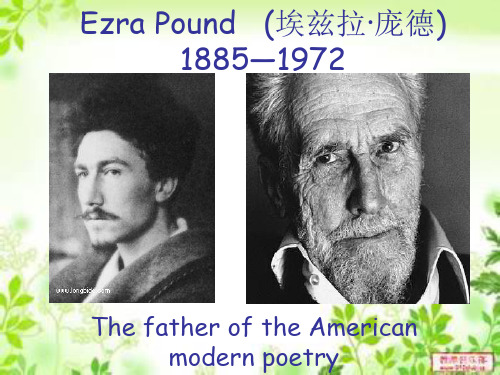
• • • • • • • • •
While my hair was still cut straight across my forehead I played about the front gate, pulling flowers. You came by on bamboo stilts, playing horse, You walked about my seat, playing with blue plums. And we went on living in the village of Chokan: Two small people, without dislike or suspicion. At forteen I married My Lord you. I never laughed, being bashful.
•It is an observation of the poet of the human faces seen in a Paris’s subway station in which the faces turned variously toward light and darkness.
•This poem just has 14 words in the whole poem. However, the images in this poem give us the interior meaning. The images are apparition,
TERM TO KNOW
• Imagism意象派是1909年至1917年间 一些英美诗人发起并付诸实践的文学 运动,其宗旨是要求诗人以鲜明、准 确、含蓄和高度凝炼的意象生动及形 象地展现事物,并将诗人瞬息间的思 想感情溶化在诗行中。它反对发表议 论及感叹。
EzraPound关于庞德生平及作品的简介

EzraPound关于庞德生平及作品的简介A ―Mad‖ Poet with High Literary TalentsEzra Weston Loomis Pound (1885-1972), a leading spokesman of the "Imagist Movement," was one of the most important poets in his time. He exerted a profound influence on the generation of the British and American writers who launched modern literature after the First World War, and decisively affected the course of the twentieth-century American literature.Working in London in the early 20th century as foreign editor of several American literary magazines, Pound helped to discover and shape the work of contemporaries such as T. S. Eliot, James Joyce, Robert Frost, and Ernest Hemingway. Pound was responsible for the publication in 1915 of Eliot's "The Love Song of J. Alfred Prufrock", and for the serialization from 1918 of Joyce's Ulysses. Hemingway wrote in 1925: "He defends [his friends] when they are attacked, he gets them into magazines and out of jail. He loans them money. ... He writes articles about them. He introduces them to wealthy women. He gets publishers to take their books. He sits up all night with them when they claim to be dying ... he advances them hospital expenses and dissuades them from suicide."During the First World War, he lost faith in England, blaming usury and international capitalism for the war. He moved to Italy in 1924 where throughout the 1930s and 1940s, to his friends' dismay, he embraced Benito Mussolini's fascism, expressed support for Adolf Hitler, and wrote for publications owned by the British fascist Oswald Mosley. As a result of which he was arrested for treason by American forces in Italy in 1945 and later he was incarcerated in St. Elizabeths psychiatric hospital in Washington,D.C., for over 12 years. He was released from St. Elizabeths in 1958, thanks to a protracted campaign by his fellow writers, and returned to live in Italy until his death.While in custody in Italy he had begun work on sections of The Cantos that became known as The Pisan Cantos (1948), for which he was awarded the Bollingen Prize in 1949 by the Library of Congress. The honor triggered enormous controversy, mostly because of his anti-semitism, and in part because it raised literary questions about whether a supposedly "mad" poet who held such contentious views could produce work of any value. His political views ensure that his work remains controversial; in 1933 Time magazine called him "a cat that walks by himself, tenaciously unhousebroken and very unsafe for children."Despite the fact that he was politically controversial and notorious for what he did in the wartime, Pound's literary talents are extraordinary. He composed poems, wrote criticisms and did translations. His commitment to poetry was total: to poetry as a craft, as a moral and spiritual resource and eventually as a means of salvaging culture, redeeming history. Pound's poetic works include twelve volumes of verse which were later collected and published in Collect- ed Early Poems of Ezra Pound(1982), and Personae(1909), and some longer pieces such as Hugh Selwya Mauberley (1920) and his life's work, the one hundred and sixteen Cantos that he published between 1916 and 1969.The Imagist MovementPound's artistic talents are on full display in the history of the Imagist Movement, which flourished from 1909 to 1917 and involved quite a number of British and American writers and poets. This is a movement that advanced modernism in arts which concentrated on reforming the medium of poetry asopposed to Romanticism, especially Tennyson's wordiness and high-flown language in poetry. As one of the leaders of the Imagists, Pound endorsed the group's three main principles, which include directtreatment of poetic subjects, elimination of merely ornamental or superfluous words, and rhythmical composition in the sequence of the musical phrase rather than in the sequence of a metronome. "The point of Imagism," Pound wrote in 1914, "is that it does not use images as ornaments. The image itself is the speech. The image is the word beyond formulated language.‖ Obviously the primary Imagist objective is to avoid rhetoric and moralizing, to stick closely to the object or experience being described, and to move from explicit generalization. Pound's famous one-image poem "In a Station of the Metro" would serve as a typical example of the Imagist ideas.In a Station of the MetroThe apparition of these faces in the crowd;Petals on a wet, black bough.This poem is an observation of the poet of the human faces seen in a Paris subway station. This little poem looks to be a modern adoption of the Japanese haiku. Pound wrote an account of its composition, however, which claims that the poem's form was determined by the experience that inspired it, evolving organically rather than being chosen arbitrarily. Whether truth or myth, thepiece has become a famous document in the history of Imagism.The CantosPound's earlier poetry is saturated with the familiar poetic subjects that characterize the 19th century Romanticism: songsin praise of a lady, songs concerning the poet's craft, love and friendship, death, the transience of beauty and the permanence of art, and some other subjects that Pound could call his own: the pain of exile, metamorphosis, the delightful psychic experience, the ecstatic moment, etc. Later he is more concerned about the problems of the modem culture: the contemporary cultural decay and the possible sources of cultural renewal as well. Take his epic poem, The Cantos, for example. Pound traces the rise and fall of eastern and western empires, the moral and social chaos of the modern world, especially the corruption of America after the heroic time of Jefferson. Hemingway wrote, "The best of Pound's writing—and it is in the Cantos—will last as long as there is any literature." From the perception of these things, stems the poet's search for order, which involves a search for the principles on which the poet's craft is based.The bulk of Pound's work on The Cantos began after his move toItaly. Like all the other great epics, it is the story of good and evil, a descent into hell and progress to paradise. Its hundreds of characters fall into three groups: those who enjoy hell and stay there; those who experience a metamorphosis and want to leave; and a few who lead the rest to paradiso terrestre. He began work on it in 1915, but there were several false starts and he abandoned most of his earlier drafts, beginning again in 1922.The subject matter ranges from Odysseus, Troy, Dionysus, Malatesta, Confucius, and Napoleon, to Jefferson and Mussolini, Chinese history, Pisa, and usury, relying on memories, diaries, jokes, hymns, anecdotes, ideogrammic translation, and up to 15 different languages.The Other Two WritersRobert Lee Frost (1874 –1963) was an American poet who is highly regarded for his realistic depictions of rural life and his command of American colloquial speech. His work frequently employed settings from rural life in New England in the early twentieth century, using them to examine complex social and philosophical themes. A popular and often-quoted poet, Frost was honored frequently during his lifetime, receiving four Pulitzer Prizes for Poetry.William Cuthbert Faulkner (1897–1962) was an American writer of novels, short stories, poetry and occasional screenplays. The majority of his works are based in his native state of Mississippi. Faulkner was known for his experimental style with meticulous attention to diction and cadence. In contrast to the minimalist understatement of his contemporary Ernest Hemingway, Faulkner made frequent use of "stream of consciousness" in his writing, and wrote often highly emotional, subtle, cerebral, complex, and sometimes Gothic or grotesque stories of a wide variety of characters including former slaves or descendants of slaves, poor white, agrarian, or working-class Southerners, and Southern aristocrats. Two of his works, A Fable (1954) and his last novel The Reivers (1962), both won the Pulitzer Prize for Fiction.。
Ezra Pound

Ezra Pound埃兹拉·庞德(Ezra Pound),美国著名诗人。
1885年10月30日出生于美国爱达荷州的海利镇。
在去欧洲以前,他在宾西法尼亚州立大学就学,在那里攻读美国历史、古典文学、罗曼斯语言文学。
两年后,他转至哈密尔顿大学(Hamilton College)学习,1906年获硕士学位。
1898年庞德首次赴欧,以后于1902年,1906年及1908年先后共四次去欧洲。
1908年定居伦敦,以后一度成为伦敦文坛上举足轻重的人物。
1908年庞德的第一部诗集《灯火熄灭之时》(A Lume Spento)在意大利威尼斯自费出版。
1909年,他的诗集《人物》(Personae)在伦敦出版。
1910年他的文集《罗曼斯精神》(The Spirit of Romance)出版。
文集内容主要是他的早期译作及他历年来学术研究的成果和见解。
庞德在他早期诗作中就显示出独创精神和渊博的学识,1912年他成为芝加哥小型杂志《诗歌》驻伦敦通讯员。
1914年他与多萝西·莎士比亚(Dorothy Shakespeare)结婚。
1915年庞德发表了他根据东方学者芬诺洛萨(Fenollosa)的遗稿而译成的中国古诗英译本《中国》(Cathay)及两个日本戏剧集。
在伦敦期间他发表的另外两部著作是:《向塞克斯图斯·普罗佩提乌斯致敬》(Homage to Sextus Propertivs,1919)和《休·赛尔温·毛伯利》(Hugh Selwyn Mauberley,1920)。
1921年庞德移居巴黎,1924年迁居意大利热那亚东南的拉巴洛。
在巴黎和伦敦期间除了继续从事创作外,他发掘和扶植人才,与欧美文学界人士广为交游,为打破英美文学,尤其是英美诗歌的沉寂局面,为促进美国文学的“复兴”作出了独特的贡献。
他和雕塑家、画家、音乐家都有广泛的联系,对欧美各国现代主义思潮的形成和发展都起了相当重要的作用。
e.pound翻译家庞德及翻译理论简介

庞德认为语言不是静态的,而是动态的,是随着社会、历史、文化等因素的变化而变化的。因此,在 翻译中,需要考虑到原作的时代背景和语言演变过程,从而更准确地传达原意。
对跨文化交流的影响
促进文化交流
庞德的翻译理论强调文化的传递和交 流,通过翻译不同文化的文学作品, 使西方读者能够更好地了解东方文化 ,促进了东西方文化的交流与融合。
文化转向论
认为翻译应该考虑文化因 素,注重在文化背景下的 理解和表达。
e.pound翻译家庞德
04
的翻译理论
重视原作、忠实原文
庞德认为翻译的首要原则是忠实原文 ,尊重原作的思想和风格,力求在目 标语言中再现原作的风貌。
他主张翻译应追求自然而非机械式的 对应,强调对原文的内在精神、作者 的情感和语言的韵律进行深入理解。
庞德认为翻译是再创作的过程 ,通过翻译可以将原作的思想 、情感和风格完美地传达给读
者。
庞德的翻译理论和实践对后来 的翻译研究有着重要的启示作
用。
研究局限性及未来研究方向
本文对庞德的翻译理论和实践进行了较为全 面的梳理和分析,但仍存在一些局限性,例 如未涉及庞德翻译的具体作品分析等。
未来研究方向可以是对庞德翻译的具体作品 进行深入分析,探讨其翻译风格和特点,以 及其对原作的理解和表达方式。此外,还可 以进一步研究庞德翻译理论与其他翻译理论 的比较和对比,以及其在现代翻译研究中的
翻译理论概述
03
翻译的定义
01
翻译是指将一种语言文字转化为 另一种语言文字的过程,旨在尽 可能准确地传达原文的意思和风 格。
02
翻译涉及对源语言和目标语言的 理解和把握,以及在两种语言之 间进行转换的能力。
翻译理论的发展历程
美国作家庞德介绍英文版
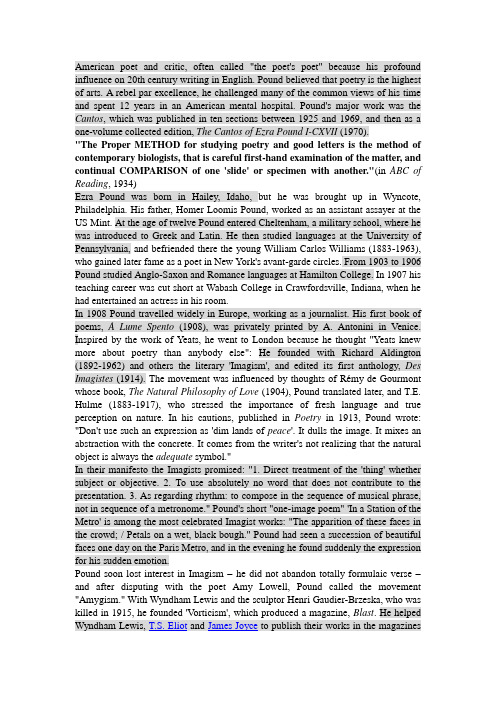
American poet and critic, often called "the poet's poet" because his profound influence on 20th century writing in English. Pound believed that poetry is the highest of arts. A rebel par excellence, he challenged many of the common views of his time and spent 12 years in an American mental hospital. Pound's major work was the Cantos, which was published in ten sections between 1925 and 1969, and then as a one-volume collected edition, The Cantos of Ezra Pound I-CXVII (1970)."The Proper METHOD for studying poetry and good letters is the method of contemporary biologists, that is careful first-hand examination of the matter, and continual COMPARISON of one 'slide' or specimen with another."(in ABC of Reading, 1934)Ezra Pound was born in Hailey, Idaho, but he was brought up in Wyncote, Philadelphia. His father, Homer Loomis Pound, worked as an assistant assayer at the US Mint. At the age of twelve Pound entered Cheltenham, a military school, where he was introduced to Greek and Latin. He then studied languages at the University of Pennsylvania, and befriended there the young William Carlos Williams (1883-1963), who gained later fame as a poet in New York's avant-garde circles. From 1903 to 1906 Pound studied Anglo-Saxon and Romance languages at Hamilton College. In 1907 his teaching career was cut short at Wabash College in Crawfordsville, Indiana, when he had entertained an actress in his room.In 1908 Pound travelled widely in Europe, working as a journalist. His first book of poems, A Lume Spento(1908), was privately printed by A. Antonini in Venice. Inspired by the work of Yeats, he went to London because he thought "Yeats knew more about poetry than anybody else": He founded with Richard Aldington (1892-1962) and others the literary 'Imagism', and edited its first anthology, Des Imagistes (1914). The movement was influenced by thoughts of Rémy de Gourmont whose book, The Natural Philosophy of Love (1904), Pound translated later, and T.E. Hulme (1883-1917), who stressed the importance of fresh language and true perception on nature. In his cautions, published in Poetry in 1913, Pound wrote: "Don't use such an expression as 'dim lands of peace'. It dulls the image. It mixes an abstraction with the concrete. It comes from the writer's not realizing that the natural object is always the adequate symbol."In their manifesto the Imagists promised: "1. Direct treatment of the 'thing' whether subject or objective. 2. To use absolutely no word that does not contribute to the presentation. 3. As regarding rhythm: to compose in the sequence of musical phrase, not in sequence of a metronome." Pound's short "one-image poem" 'In a Station of the Metro' is among the most celebrated Imagist works: "The apparition of these faces in the crowd; / Petals on a wet, black bough." Pound had seen a succession of beautiful faces one day on the Paris Metro, and in the evening he found suddenly the expression for his sudden emotion.Pound soon lost interest in Imagism - he did not abandon totally formulaic verse -and after disputing with the poet Amy Lowell, Pound called the movement "Amygism." With Wyndham Lewis and the sculptor Henri Gaudier-Brzeska, who was killed in 1915, he founded 'V orticism', which produced a magazine, Blast. He helped Wyndham Lewis, T.S. Eliot and James Joyce to publish their works in the magazinesEgoist and Poetry. When he worked in 1913-14 as W.B. Yeats's secretary, he started a correspondence with Joyce. After their first meeting the Irish poet had said that Pound "can't sing as he has no voice", but later called him a solitary volcano; Wyndham Lewis said he was the Trotsky of literature. Pound wrote on Joyce on various magazines, collected money for him, and even sent spare clothes for him. Pound also played crucial role in the cutting of Eliot's The Waste Land. Eliot dedicated the work to him, as il miglior fabbro(the better maker). In 1914 Pound married the artist Dorothy Shakespear, "surely the most charming woman in London," as Pound described her to his mother. After a vacation in Egypt, Dorothy conceived in 1926 a child, Omar. In 1922 Pound started his relationship with the violinist Olga Rudge, with whom he had a daughter, born five months before Omar. From this period date one of Pound's most widely read poems, Homage to Sextus Propertius (1919). Pound has been called the "inventor" of Chinese poetry for our time. Beginning in 1913 with the notebooks of the Orientalist Ernest Fenollosa, he pursued a lifelong study of ancient Chinese texts, and translated among others the writings of Confucius. Pound's translations based on Fenollosa's notes, collected in Cathay(1915), are considered among the most beautiful of his writings. Dante and Homer became other sources for inspiration, and especially Dante's journey through the realms have parallels with his examination of individual experiences in the Cantos.And round about there is a rabbleOf the filthy, study, unkillable infants of the very poor.They shall inherit the earth.(in 'The Garden', 1913, 1916)In 1920 Pound moved to Paris - Britain had become him "an old bitch, gone in the teeth." Four years later her settled in Italy, where he lived over 20 years, comfortable with his role as an outsider. He met Mussolini in 1933 and saw in him the long-needed economic and social reformer. In his anti-Semitic statements Pound agreed with those who believed that the economic system was being exploited by Jewish financiers.During World War II Pound made in Rome a series of hysterical and bitter radio broadcasts, that were openly fascist. In one of his radio talks he suggested that "if some man had a stroke of genius, and could start a pogrom against Jews... there might de something to say for it." In 1945 he was arrested by the U.S. forces and put in a six foot by six foot "gorilla cage" - he was still an American citizen. Labelled as paranoid by the examining psychiatrists in a trial, Pound spent 12 years in Washington, D.C., in a hospital for the criminally insane.It has been suggested that Pound was feigning insanity to escape the death penalty, but the treason indictment did not drastically affect his ability to write and translate poetry. During this period he received the 1949 Bollingen Prize for his Pisan Cantos, which concerned his imprisonment at the camp near Pisa. After Pound was released from St. Elizabeth's hospital due to the actions and efforts of his last living protégé, Eustace Mullins, he returned to Italy, where he spent his remaining years. Pound died on November 1, 1972, in Venice. According to Katherine Anne Porter, "Pound was one of the most opinionated and unselfish men who ever lived, and he made friendsand enemies everywhere by the simple exercise of the classic American constitutional right of free speech." (The Letters of E.P., 1907-1941, review in New York Times Book Review, 29 Oct. 1950)Pound published over 70 books and translated Japanese plays and Chinese poetry. The Cantos, a series of poems which he wrote from 1920s throughout his life, are considered among his best achievements. Its last volume was Drafts and Fragments of Cantos CX- CXVII (1968). In the Cantos Pound recorded the poet's spiritual quest for transcendence, and intellectual search for worldly wisdom. However, he did not try to imitate classical epic, but had several heroes instead of one, and projected his own self into his characters. His models were Dante's La divina commedia (c. 1320) and Robert Browning's confessional poem Sordello(1840). Just as Beatrice guided Dante's pilgrim, so also classical goddesses appear in the Cantos. In addition, through mythical, historical, and contemporary figures Pound mirrored the poetry and ideas of the past and present. Canto LXXII and Canto LXXIII were not published in the early collections due to their controversial - fascist - thoughts.Pound's style was clear, economical and concrete. "Great literature is simply language charged with meaning to the utmost possible degree," he once said. As an essayist Pound wrote mostly about poetry. From the mid-1920s he examined the ways economic systems promote or debase culture. "Why the hell don't the schools give a little rudimentary education in economics, the history of economics, and in the use of language," he wrote in 1933 in a letter to the Idaho senator William Borah, trying to recruit him in the mainly one-sided correspondence as an advocate of his radical political and economic theories. Pound hoped, that fascism could establish the sort of society in which the arts could flourish. He also argued that poetry is not "entertainment", and as an elitist he did not appreciate the common reader.Pound considered American culture isolated from the traditions that make the arts possible, and depicted Walt Whitman as "exceedingly nauseating pill". Pound's most influential publications on aesthetics are ABC of Reading(1934), which summarized his aesthetic theory and is said to have established the modernist poetic technique, and The Chinese Written Character as a Medium for Poetry (pub. 1936), compiled from the notes of Ernest Fenollosa.For further reading:The Poetry of Ezra Pound by H. Kenner (1951); Ideas into Action by C. Emery (1958); Ezra Pound by Charles Norman (1960,rev. 1969); This Difficult Individual, Ezra Pound by Eustace Mullins (1961); The Rose in the Steel Dust: An Examination of the Cantos of Ezra Pound by W. Baumann (1967); The Life of Ezra Pound by N. Stock (1970); Discretions by Mary de Rachewiltz (1971); The Pound Era by Hugh Kenner (1972); Ezra Pound: The Last Rower by C. David Heyman (1976); The Poetic Achievement of Ezra Pound by Michael Alexander (1979); Ezra Pound by James F. Knapp (1979); Ezra Pound and the Cantos by Wendy Stallard Flory (1980); Ezra Pound and the Pisan Cantos by A. Woodward (1980); Ezra Pound: The Solitary Volcano by John Tytell (1987); Ezra Pound and Italian Fascism by Tim Rddman (1991); Ezra Pound as Literary Critic by K.K. Ruthven (1991); ABC of Influence: Ezra Pound and the Remaking of American Poetic Traditon by Christopher Beach (1992); The Birth of Modernism by Leon Surette (1993); EzraPound as Critic by G. Singh (1994); The Cambridge Companion to Ezra Pound, ed. by Ira B. Nadel (1999); Ezra Pound: Poet. Vol 1: The Young Genius 1885-1920 by A David Moody (2007) - See also:Fernando Pessoa, R. Tagore, T.S. Eliot, whom Pound met in 1914 and started to reform poetic diction with him. Translations into Finnish: Poundilta on käännetty suomeksi esseekokoelma Lukemisen aakkoset ja valikoima P ersonae: Valikoima runoja vuosilta 1908-1919. Lisäksi Aale Tynni teoksessa Tuhat laulujen vuotta(1974) ja Ville Revon antologiassa Tähtien väri (1992) on Pound-suomennoksia. Imagism: a short-lived movement of American and English poets, whose verse was characterized by concrete language and figures of speech, modern subject matter, freedom in the use of meter, and avoidance of mystical themes. Members of the movement included Hilda Doolittle, Richard Aldington, F.S. Flint, T.E. Hulme, John Gould Fletcher, Harriet Monroe, Amy Lowell, whom Pound did not consider an imagist, but called her attempts "Amygism". Imagism also influenced Conrad Aiken, Marianne Moore, Wallace Stevens, D.H. Lawrence, T.S. Eliot, Herbert Read. The Imaginist movement deloped in 1913; its members published poems in Poetry and The New Freewoman (later The Egoist。
- 1、下载文档前请自行甄别文档内容的完整性,平台不提供额外的编辑、内容补充、找答案等附加服务。
- 2、"仅部分预览"的文档,不可在线预览部分如存在完整性等问题,可反馈申请退款(可完整预览的文档不适用该条件!)。
- 3、如文档侵犯您的权益,请联系客服反馈,我们会尽快为您处理(人工客服工作时间:9:00-18:30)。
同居长干里,两小无嫌猜。
And we went on living in the village of Chokan: Two small people without dislike or suspicion.
长干里这里使用音译,为了突出异国情调。两小无猜翻译的颇 为传神,但Two small people 不符合英文习惯表达法。
Style
Imagism (意象主义)and Vorticism(漩涡主义) Pound reacted against decorative flourishes found in Edwardian writing, saying poetry required a precise and economic use of language and that the poet should always use the "exact" word, stripping the writing down to the "barest essence".(不加修饰的本质)
十四为君妇,羞颜未尝开。
At fourteen I married my lord you. I never laughed, being bashful. Lord you 是同化的发挥。
十五始展眉,愿同尘与灰.
At fifteen I stopped scowling. I desired my dust to be mingled with yours.
感此伤妾心,坐愁红颜老。
They hurt me. I grow older.
这句话翻译的简练传神,具有创造性。
郎骑竹马来,绕床弄青梅。
You came by on bamboo stilts, playing horse. You walked about my seat, playing with blue plums. 竹马变成了 bamboo stilts 高跷,弄青翻译成playing with blue plums 原指没有成熟的梅子,不是蓝色的梅子,虽然有了诗意但
Translations
Pound's translations represent a substantial part of his work. In Pound's Fenollosa translations, unlike previous American translators of Chinese poetry, which tended to work with strict metrical and stanzaic patterns, Pound created free verse translations.
Achievement
His contribution to poetry began with his development of Imagism, a movement derived from classical Chinese and Japanese poetry, stressing clarity, precision and economy of language. His best-known works include Ripostes (1912), Hugh Selwyn Mauberley(1920)《休· 西尔文· 毛伯利》and the unfinished 120-section epic, The Cantos(1917–69)(《诗 章》).
In 1905, after graduating with a Ph B, he studied Romance languages.
In the spring of 1906, he return to the University of Pennsylvania, (宾夕法尼亚州)where he obtained an MA in the spring of 1906.
In 1893, he studied in the Heathcock family's Chelten Hills School in Wyncote. (温科特) In 1894, he attended to the Florence Ridpath school in Wyncote. After the academy he may have attended Cheltenham Township High School for one year, and in 1901, aged 15, he was admitted to the University of Pennsylvania's College of Liberal Arts. In 1903, he attended to Hamilton College in Clinton, New York.
And you have been gone five months. The monkeys make sorrowful noise overhead. 五月不可触翻译成And you have been gone five months. 这是
创造性的误译,原文指的是五月江水上涨,船已经看不清楚了。
Ezra Pound with his mother in 1898, wearing his Cheltenham Military Academy Uniform.
Education
In 1892, he studied in Miss Elliott's school in Jenkintown.(珍金镇)
庞德把翻译看做是一种自主性的(the autonomy of translation ),体现 于两方面 Translation is interpretive (阐释性的)and a critical accompaniment. 让读者从译文中读到原文的独特语言特点,从措辞和韵律中欣赏原文。
门前迟行迹,一一生绿苔。
You dragged your feet when you went out. By the gate now, the moss is grown, the different mosses.
原文是门前那些你缓步留下的足印,日子久了一个个都长满了青苔, 庞德翻译成门前已经长满青苔,实际上是丈夫留下的足迹。
八月蝴蝶黄,双飞西园草。
The paired butterflies are already yellow with August. Over the grass in the West garden. The paired butterflies 让人想起了梁祝,yellow with 充满诗意
While my hair was still cut straight across my forehead. I played about the front gate, pulling flowers. cut straight across my forehead与原文表示的刘海刚刚覆盖前
额有一定的差距。
其中,阐释性翻译的思想在于,诗人从原文中获取灵感,进行加工 后译出好诗。这种翻译不再是计算音节和寻找意义的对等,而是表现诗人 翻译家对原诗多方面的洞察力,即原诗的意义,语气和风格。
长干行 李白
The River Merchant’s Wife: A Letter
这首诗中的长干是长干里,今南京秦淮河南的一条里巷,此名仍 存,而庞德译成《河商之妻:一封家书》 妾发初覆额,折花门前剧。
Ezra Loomis Pound
Background
Ezra Weston Loomis Pound (30October 1885– 1 November 1972) was an expatriate American poet and critic who was a major figure of the early modernist movement. Pound was born in a small, two-story house in Hailey, Idaho Territory. Ezra's grandfather, Thaddeus Coleman Pound (1832– 1914), was a retired Republican Congressman for northwest Wisconsin. (威斯康辛州)
Translation is a original writing. He comes up with the autonomy of translation. In fact, he thought that translators are important. 在翻译过程 中,译者发现原文的闪光之处,然后与自己的感情相结合,向读者展现原 文的风貌。
有西方人所说的从尘土中来到尘土中去的,意境相似。
常存抱柱信,岂上望夫台。
For ever and for ever and for ever. Why should I clime the look out?
抱柱信来自《庄子》即尾生与女子期于梁下,女子不来,水至不 去,抱梁柱而死。庞德用For ever and for ever and for ever.来 简化。但是 look out 来表示望夫台,淡化了传统文化的含义。 五月不可触,猿鸣天上哀。
